The Met, perhaps because this Nicholas Hytner production has been borrowed
from Covent Garden where it has been playing for two years, has for once not
made the mistake of undercutting a grand opera (such as Boris Godunov) by
staging it as if it were a chamber drama, or staging intimate dramas (like The
Nose and From the House of the Dead) as if they were grand operas. The new Don
Carlo lets Verdi’s grandest work be grand, complete with massed forces
and shocking coups de théâtre.
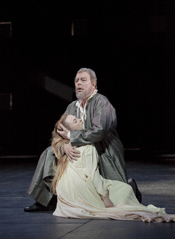 Ferruccio Furlanetto as King Philip and Marina Poplavskaya as Elisabeth
Ferruccio Furlanetto as King Philip and Marina Poplavskaya as Elisabeth
The problem Verdi set himself in Don Carlo, following Schiller’s 1787
verse drama, was to represent political conflict with individual characters
without sacrificing their individuality. This difficulty lies in the way of
stage directors as well: If the figures are too personal, the issues fade,
become unreal; if the political factors take the foreground, the characters may
forfeit our sympathy. Verdi’s individuals each go through a soul-struggle
before our eyes and ears; their agony brings them tragic stature and makes the
conflict rending society (then and now) between individual conscience and
reasons of state more vivid to us. For both Schiller and Verdi, the drama is
the protest of the individual against the crushing demands of the tyrannical
state, and though the focus of their sympathies is never in doubt, they fully
state the case for the latter to create a richer tragedy.
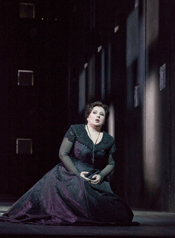 Anna Smirnova as Eboli
Anna Smirnova as Eboli
It wasn’t an easy birth. Verdi ultimately created three performing
versions of the score; a fourth, drawing on cuts made before the 1867 premiere,
was devised for James Levine at the Met in 1979. The current Met version is
Verdi’s number three: Five acts sung in Italian translation, no ballet
(only done in Vienna nowadays), no war-weary introduction (resurrected from
opening night discards for Levine). It is a measure of the composer’s
genius that, faced with the conflicting demands of story, persona, history and
politics, he produced a masterpiece that has become an audience favorite.
Hytner stages Don Carlo in the three favorite colors of Spain: crimson, gold
and black. Anyone dressed otherwise (the French court in blue, the Flemish
envoys in brown) is clearly an outsider, and the chorus costumes are
repetitive, which makes the main characters stand out. The portrait Carlo gives
Elisabetta when he first meets her at Fontainebleau is in a crimson locket,
which stands out against his black costume and her white one. In Act IV, when
the King finds the portrait, it is recognizably the same crimson locket. The
set often features a stylized black wall of small, rat-hole windows, a fortress
or a prison for Carlo, cutting him off from human contact—but it also
becomes the spy-filled court for the King’s study. Elisabetta is first
seen as rather a hoyden, in cheerful silver French court dress, romping through
the woods and firing a musket at (let us assume) deer. The contrast of her
uninhibited behavior and flowing golden tresses with the rigid figure she plays
in black or red after her wedding makes the proper point.
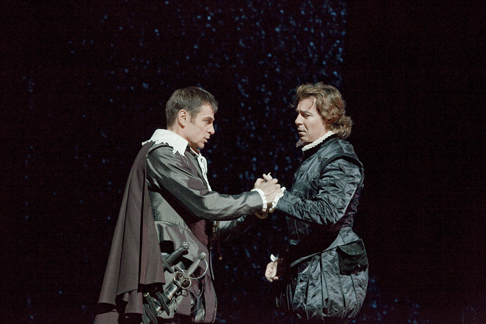 Roberto Alagna as Don Carlo and Simon Keenlyside as Posa
Roberto Alagna as Don Carlo and Simon Keenlyside as Posa
On the not-so-excellent side, Hytner appears to miss the point of
Eboli’s Veil. That lady enters with a flamboyant showpiece about a king
who accidentally woos his own veiled wife; thus Verdi subtly lets us know she
has secrets of her own—she is in love with Carlo, but is the king’s
mistress. (In Schiller, she is also the Queen’s false friend; Verdi
couldn’t work that in.) When next we meet her, in the garden scene, she
is veiled and Carlo makes love to her by mistake. Then, when the Queen learns
of her treachery, with unconscious irony she orders Eboli to choose
“between exile and the Veil,” that is, a nunnery. Hytner misses
this through-line, which is not important. What is important is that we
understand how Eboli, in the garden scene, deduces that Carlo loves the Queen.
In the omitted previous scene, Eboli and the Queen exchanged veils; some Ebolis
take off the veil and notice it again when Carlo recoils from her avowals,
realizing only then that he thought he was making love to some other lady.
Hytner’s Eboli, in contrast, keeps the veil on her head and simply makes
a guess out of thin air. This is not thoughtful theater.
Another character whose potential Hytner seemed to miss was the mysterious
Friar, who turns out to be the King’s abdicated, possibly dead, father,
Emperor Charles V. Alexei Tarnovitsky has a rumbly bass with no suggestion of
supernatural conscience, but to have him simply stroll on to interrupt the
family tragedy forfeits the awe Verdi and his librettists hoped to create. The
musical excitement of the opera’s conclusion appears to have no
connection at all to the movements on stage at this supreme moment.
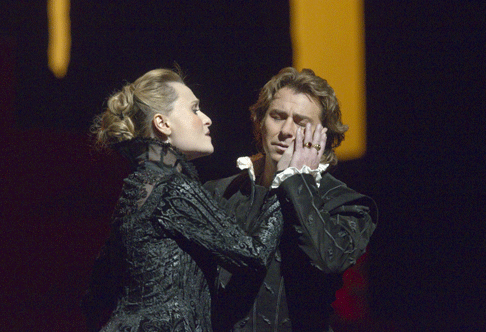 Marina Poplavskaya as Elisabeth and Roberto Alagna as Don Carlo
Marina Poplavskaya as Elisabeth and Roberto Alagna as Don Carlo
The leading singers at the second performance of the season were all good,
though only Ferruccio Furlanetto’s King Philip held his own with memories
of the Golden Age—my own personal Golden Age in this opera. Furlanetto
growled and barked at first, then, in his two great duets (Posa in Act II;
Grand Inquisitor in Act IV) and the sad monologue in his study that is the
heart of the opera, began to soar and resonate: deep sound, clear and musical,
but pulsing with thought. His way of removing his hat to wipe or clutch his
brow at climaxes in the action was of a piece with this: very personal if not
quite kingly. His burly dignity matched the dignity of his singing. He, and the
viewer, never forgot he was the figure of power, however shattered—and
which king it was, too, for like the real Philip II, he is always fiddling with
papers, carrying his work about with him everywhere.
Roberto Alagna sang Carlo brashly and often beautifully. His “Io la
vidi” seemed now and then to be shorter or longer than the proper
placement of words on notes, as if he unconsciously remembered singing it in
his native French (to which language the music was, after all,
composed)—it is a pity that the opera has never been heard at the Met in
the original tongue when it has been so heard in Boston, San Francisco and
Seattle, to say nothing of Paris and Vienna.
Marina Poplavskaya produces a Verdi-sized sound of great depth and luster;
it’s been a long time since we had such an Elisabetta. That said, the
role is long and can tax the hardiest; in both her arias, Poplavskaya ran short
of breath before the end. Her first duet with Carlo was promising, but her
cries for justice in the study scene not especially effective. Sometimes she
sounds wonderful and sometimes she is inaudible just when one would like her
voice to emerge from the pack. It is a puzzling, interesting voice.
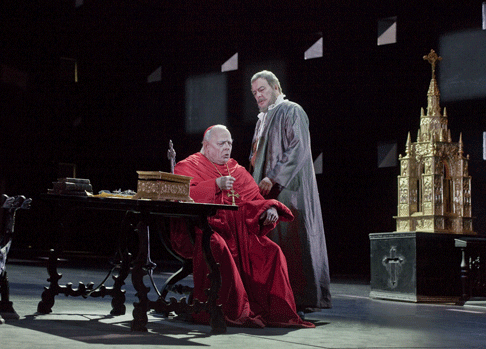 Ferruccio Furlanetto as King Philip and Eric Halfvarson as Grand Inquisitor
Ferruccio Furlanetto as King Philip and Eric Halfvarson as Grand Inquisitor
Anna Smirnova has the plummy Russian mezzo deep tones that make one think of
Borodina, but Borodina could handle the high notes as well, and Smirnova is hit
or miss: I wouldn’t trust her with Dalila or Carmen. Her Song of the Veil
drew proper attention to herself, but she lacked both sensuality and wrath in
the garden scene. “O don fatale” was her best work of the night, as
it should be, but there were phrases produced inexactly, that flew off into the
wings.
Good Posas can be vocally imposing (Merrill, Milnes) or thoughtfully so
(Hynninen, Hampson, Alan Titus). Simon Keenlyside is an interesting Posa, an
effective actor—if anything perhaps too individual for the
courtier-confidante he must seem to be—with an ingratiating sound that
does not quite fill the Met. He has to act harder because his voice simply
can’t match Furlanetto or Alagna for power. As with his Hamlet, I felt
that performing a role in smaller houses does not serve him well here. He
should come to the Met, if he comes, in something he has not sung elsewhere.
Eric Halfvarson impressed as the Grand Inquisitor, Jennifer Check made an
unusually able Celestial Voice (was she mic’d?), Layla Claire a pleasant
Tebaldo, and Alexei Tarnovitsky a not very awe-inspiring Friar/Charles V.
Yannick Nézet-Séguin has a genuine feel for dramatic propulsion and kept the
enormous work in constant motion. He has a graceful touch with a score that can
be ponderous; he makes the melodies sing. Scene followed scene followed scene,
but there was no slackening of tension, no moment when we were not savoring
Verdi’s “tinta,” the specific color he devised for each of
his operas, and were not eager to hear more.
John Yohalem
![Roberto Alagna [Photo by Ken Howard courtesy of The Metropolitan Opera]](http://www.operatoday.com/Alagna_DonCarlo.gif)




